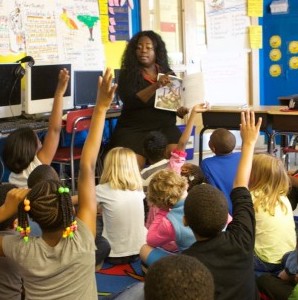 A new study from researchers at Johns Hopkins University in Baltimore, American University in Washington, D.C., the University of California, Davis, and the University of Connecticut has found that Black students who have at least one Black teacher in elementary school are much more likely to graduate high school and go on to college.
A new study from researchers at Johns Hopkins University in Baltimore, American University in Washington, D.C., the University of California, Davis, and the University of Connecticut has found that Black students who have at least one Black teacher in elementary school are much more likely to graduate high school and go on to college.
The researchers found that Black students who had just one Black teacher by third grade were 13 percent more likely to enroll in college, and those who had two Black teachers were 32 percent more likely to go to college.
Additionally, the research found that students who had at least one Black teacher during their K-3 years, were more likely to be described by their fourth grade teacher as “persistent” or that they “made an effort” and “tried to finish difficult work.” Previous studies from this research team had found that having at least one Black elementary school teacher reduced the probability of dropping out by 29 percent for low-income Black students and by 39 percent for very low-income Black male students.
Another recent study by the same research team found that teachers’ beliefs about a student’s college potential can predict whether or not that student actually attends college. For every 20 percent increase in a teacher’s expectations, the chance of that child actually finishing college increased by 6 percent for White students and by 10 percent for Black students. Previous studies by this team had found that White teachers expected significantly less academic success than Black teachers when they were asked to evaluate the same Black student.
“Both studies underscore the importance of gaps in information, expectations, and thus aspirations,” said co-author Nicholas Papageorge, an assistant professor of economics at Johns Hopkins University. “Many Black students from low-income families encounter few college graduates who look like them. They may conclude college isn’t something to strive for. Black teachers can counteract that view, acting as role models that provide a clear example that Black students can go to college.”
The two studies were both published by the National Bureau of Economic Research. The first study, “The Long-Run Impacts of Same-Race Teachers,” may be accessed here, and the second study, “Teacher Expectations Matter,” may be accessed here.

